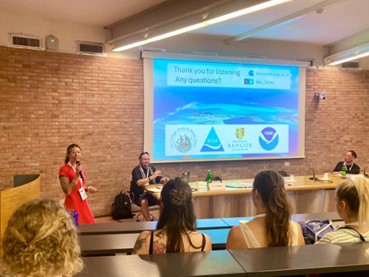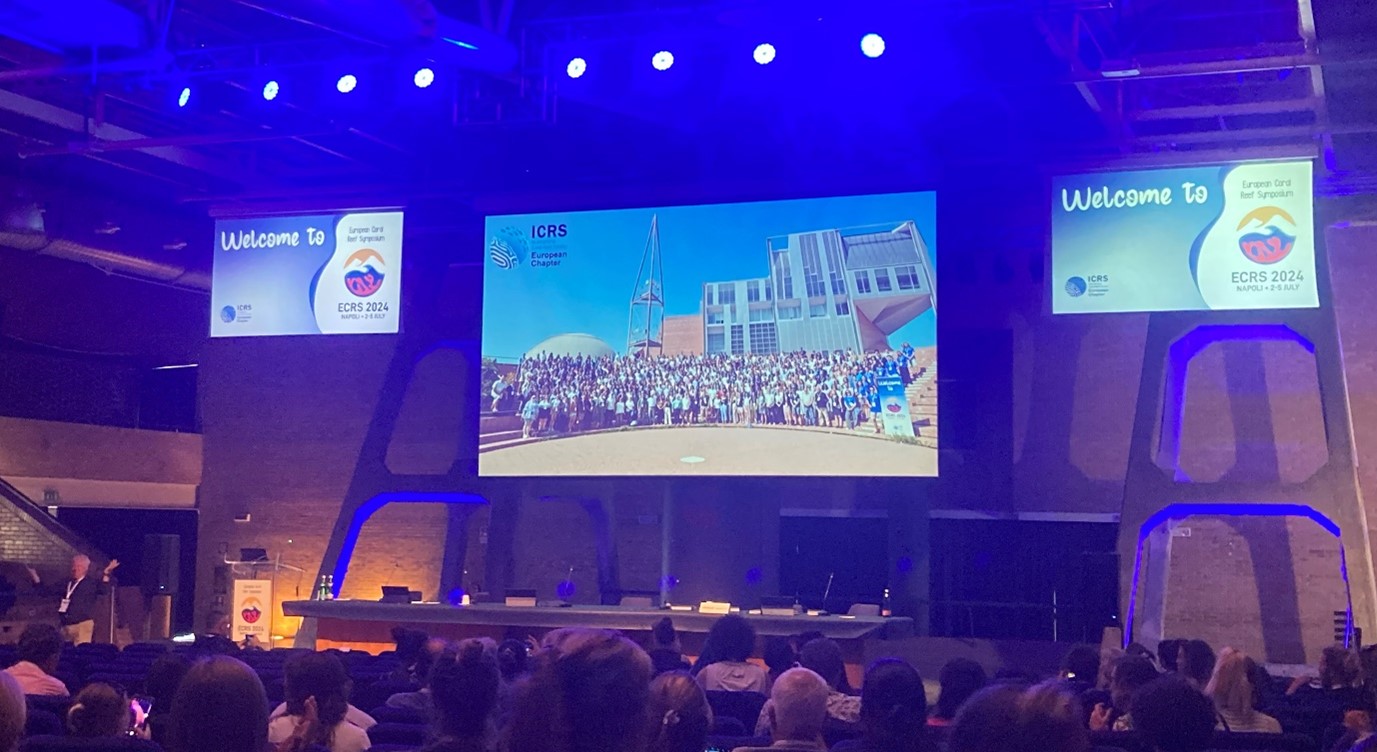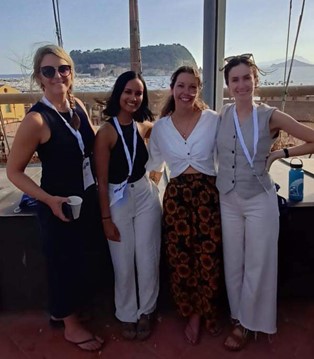European Coral Reef Symposium (ECRS)
Bex Turner
Bangor University

In July 2024, I travelled to sunny Naples, Italy, to present my research at the European Coral Reef Symposium (ECRS) thanks to the Challenger Society's Stepping Stones bursary. My research explores depth dependant zonation patterns of benthic communities on tropical coral reefs and how geography and human activities influence zonation patterns in the Pacific Ocean. During ECRS I gave a ten-minute oral presentation about my manuscript, “Local human impacts interact with geography to drive benthic community depth zonation on contemporary coral reefs”. This was the first time I had presented at a conference, so it was a nerve-wracking, but thoroughly enjoyable experience. At the time, I was completing the final stages of my manuscript, so it was exciting to share my findings with the coral reef research community and gain valuable feedback.

ECRS is held every four years by the European Chapter of the International Coral Reef Society (ICRS). ECRS 2024 took place in Naples at the Città della Scienza and at the Anton Dohrn Zoological Station and the theme was ‘Bridging knowledge gaps between tropical, temperate, and cold-water coral reefs.’ The symposium brings together coral reef scientists, researchers, conservationists, policymakers and reef managers to present their latest research and exchange knowledge crucial for coral reef conservation. The conference began with training workshops, followed by welcome cocktails and live music at the stunning Basilica di San Lorenzo Maggiore. Each day started with a plenary session from inspirational scientists such as Dr Marta Ribes, followed by a large variety of presentation sessions to choose from, followed by super interesting poster sessions. Presentation sessions I found especially engaging and useful were ‘Coral reef structure and functioning’ including the latest findings on the function and structure of coral reef ecosystems, and ‘The ocean decade: the science we need for the Coral Reefs we want’ showcasing new and innovative ideas in coral reef science. I really enjoyed the sessions as they spanned from the organism to the ecosystem level across a wide range of coral reef fields, fostering a fascinating interdisciplinary exchange. I am currently looking for a PhD and developing project proposal ideas, hearing talks about the latest research in the field was very valuable for my future career. I particularly enjoyed attending with the other wonderful women from the Reef Systems lab group; Lisa Goberdhan, Danielle Spring, and Dr Laura Richardson, and supporting them in their presentations and poster sessions. Naples provided a stunning backdrop to ECRS, from its scenic waterfront under the shadow of Vesuvius to its beautiful historic centre. In the evenings we had the chance to explore the city’s architecture, ocean views, and, of course, indulge in pizza, ice cream and coffee. What more could you want from a trip to Italy!?

Throughout ECRS there was lots of opportunities for networking therefore attending this conference greatly expanded my academic network and provided invaluable knowledge as I develop project proposals and seek PhD opportunities in coral reef ecology. I am immensely grateful to the Challenger Society for their support, as I believe attending this conference has been crucial to advancing my research and career. Presenting for the first time was nerve-wracking, but great experience, and the feedback I received has helped improve my manuscript, now under journal review. As I am not a registered student nor is my paper related to a funded grant there was no internal funding to support my attendance therefore attending ECRS was only possible thanks to the Stepping Stones bursary. This experience was essential in helping me communicate my findings to an international audience and connect with potential PhD advisors, supporting my career goals in the competitive field of coral reef ecology. Supporting women, is vital in STEM, and this bursary has helped me make a crucial step in advancing my career, particularly as I search for PhD opportunities in coral reef ecology. My research aims to benefit the marine science community by revisiting historical paradigms on coral reef depth zonation. Many of these theories were developed before human impacts rapidly escalated, and our study highlights the importance of reassessing these ideas to better understand and conserve contemporary coral reef ecosystems.

Profile
Bex Turner is a research assistant at Bangor University’s School of Ocean Sciences where she works on small scale sustainable fisheries. Bex is also a member of the ‘Reef Systems’ lab group and is currently looking to pursue a PhD in coral reef ecology.
Latest News
Royal Society Publishing Photography Competition 2025
Please see a message from the Royal Society below:
We are delighted to announce that the 2025 Competition is now open for entries until 15 August for a chance to win £1000! The competition celebrates the power of photography in conveying the wonder of science happening all around us and photographs can be submitted in the categories of: Astronomy, Behaviour, Earth Science and Climatology, Ecology and Environmental Science, and Microimaging.
The competition is free to enter and open to anyone studying or working in science at graduate level or above. Category winners will receive a one-year membership to the Royal Photographic Society and the overall winner will receive a grand prize of £1,000. Find out more: https://bit.ly/RSPphotocomp
October 2025 MEDIN Workshop: Marine Data Management, Governance and the MEDIN toolset
The Marine Environmental Data and Information Network (MEDIN) are pleased to announce that registration is now open for the next occurrence of our popular free online training workshop: ‘Marine Data Management, Governance and the MEDIN toolset’ on the 13th – 17th October 2025 on OceanTeacher Global Academy.
Marine Data Management, Governance and the MEDIN toolset
The Marine Environmental Data and Information Network (MEDIN) and OceanWise are delighted to invite you to attend our popular free online training workshop: ‘Marine Data Management, Governance and the MEDIN toolset’ on the 19th – 23rd of May 2025.
